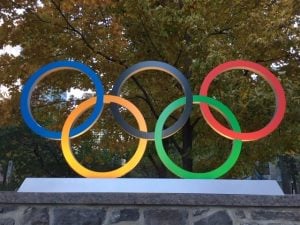Puma Sued For Declaring War On Olympics Trademarks
The biggest issue with Puma's ambush mentality is that it has the potential to seriously diminish the value for brands thinking about partnering with the USOPC.

The Olympics logo (photo by David Lat).
It was clear that the United States Olympic and Paralympic Committee (USOPC) would take issue with Puma filing a trademark application to register “PUMA TOKYO 2021” and likely file an opposition against its registration if the application ever reached that stage of the process. Instead, the USOPC has decided to kick its aggression up a notch by filing a lawsuit against Puma in the U.S. District Court for the District of Colorado for trademark infringement and unfair competition.
The complaint, filed on February 23, begins with the USOPC describing its long-standing tradition of branding the Olympic Games with trademarks that combine the name of the host city with the year when the Olympic games will take place in that city. Examples are RIO 2016, SOCHI 2014, and LONDON 2012. Due to the COVID-19 pandemic, the TOKYO 2020 Olympic Games were postponed to July 2021; however, the branding will remain TOKYO 2020. The USOPC has also started building brands surrounding BEIJING 2022 and PARIS 2024, and has secured trademark registrations for each.

Ranking The Law Firms Lawyers Love
The complaint goes on to highlight that the Trademark Trial and Appeal Board has recognized that these types of trademarks uniquely identify the USOPC, including an opinion from 1999 that states, in part,
[W]e find sufficient evidence properly in the record clearly indicating that there has been widespread publicity for the Olympic Games so that we can conclude that the Olympic Games are well known to the general public; and that the general public is likely to be well aware that the 2000 Olympic Games will be taking place in Sydney, Australia. Thus, while the general public in the United States may or may not have seen the upcoming Olympic Games referred to precisely as “Sydney 2000,” we have no doubt that the general public in the United States would recognize this phrase as referring unambiguously to the upcoming Olympic Games in Sydney, Australia, in the year 2000.
The biggest issue with Puma’s ambush mentality is that it has the potential to seriously diminish the value for brands thinking about partnering with the USOPC. Certain sponsors are afforded the exclusive right to commercially exploit the trademarks, such as TOKYO 2020, in exchange for substantial consideration. If Puma is able to palm off of the goodwill of such a name without any compensation obligation, then it could cause potential partners to rethink whether spending money on sponsorship is justified.
Congress has even previously recognized the capacity for harm caused by ambush attempts of nonofficial sponsors. A 2014 Senate Resolution states that official sponsor support is critical to the success of Team USA at all international competitions and that ambush marketing adversely affects the United States Olympic and Paralympic teams and their ability to attract and retain corporate sponsorships.
Sponsored

Curbing Client And Talent Loss With Productivity Tech

Law Firm Business Development Is More Than Relationship Building

Happy Lawyers, Better Results The Key To Thriving In Tough Times

Happy Lawyers, Better Results The Key To Thriving In Tough Times
The USOPC, in its filing, makes the claim that Puma has “declared war” on its trademarks. Its “declaration of war” is merely an attempt to benefit from an association with the Olympics without actually paying to become an official sponsor, per the complaint. Puma has filed trademark applications to register PUMA TOKYO 2021, PUMA TOKYO 2022, PUMA BEIJING 2022, and PUMA PARIS 2024.
It is not as if Puma and the USOPC were on good terms before this filing. The relationship between Puma and the USOPC could be described as tenuous at best. Puma has previously filed petitions to cancel seven trademark registrations for Olympic Games marks owned by the USOPC and separately filed a trademark opposition against a USOPC-owned trademark application.
Darren Heitner is the founder of Heitner Legal. He is the author of How to Play the Game: What Every Sports Attorney Needs to Know, published by the American Bar Association, and is an adjunct professor at the University of Florida Levin College of Law. You can reach him by email at [email protected] and follow him on Twitter at @DarrenHeitner.
Sponsored

Ranking The Law Firms Lawyers Love








